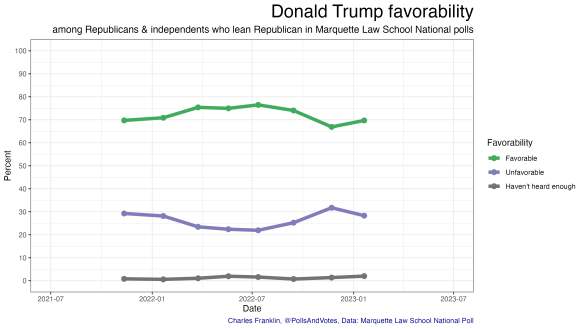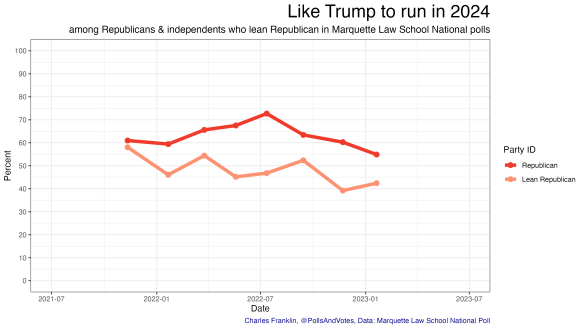Reruns? Should Biden or Trump run in 2024
Who wants a rerun in 2024?
A look at overall opinion shows that the public is not keen on either Biden or Trump running for president again in 2024. Of all registered voters interviewed in the November 2022 and January 2023 Marquette Law School Poll National surveys, 34% would like Biden to run and 29% would like Trump to run.
| Candidate | Yes | No |
|---|---|---|
| Biden | 34 | 66 |
| Trump | 29 | 71 |
Among only registered voters who consider themselves Democrats or independents who lean Democrat, 49% would like Biden to run. Among registered voters who are Republican or independent but lean Republican, 53% would like Trump to run.
Table 2: Like Biden or Trump to run by party (including leaners)
| Party, with leaners | Yes | No |
|---|---|---|
| Republican/Lean Republican | 19 | 81 |
| Independent | 24 | 76 |
| Democrat/Lean Democrat | 49 | 51 |
| Party, with leaners | Yes | No |
|---|---|---|
| Republican/Lean Republican | 53 | 47 |
| Independent | 34 | 66 |
| Democrat/Lean Democrat | 6 | 94 |
This even split in both parties comes despite generally favorable views of both Biden and Trump among registered voters of their party. Biden is viewed favorably by 82% of registered Democrats and Trump is viewed favorably by 68% of registered Republicans.
Table 3: Favorability ratings of Biden and Trump by party (including leaners)
| Party, with leaners | Favorable opinion | Unfavorable opinion | Haven’t heard enough |
|---|---|---|---|
| Republican/Lean Republican | 6 | 93 | 1 |
| Independent | 35 | 54 | 11 |
| Democrat/Lean Democrat | 82 | 16 | 2 |
| Party, with leaners | Favorable opinion | Unfavorable opinion | Haven’t heard enough |
|---|---|---|---|
| Republican/Lean Republican | 68 | 30 | 2 |
| Independent | 27 | 66 | 6 |
| Democrat/Lean Democrat | 3 | 96 | 1 |
While Democrats are more favorable to Biden than Republicans are to Trump, there is reluctance among Democrats for a Biden run in 2024 even among those with a favorable opinion of him, 57% of whom wish him to run. Among Republicans who are favorable to Trump there is higher support for a run, 72%.
Table 4: Like to run by favorablity by party (including leaners)
| Favorability | Yes | No |
|---|---|---|
| Favorable opinion | 57 | 43 |
| Unfavorable opinion | 11 | 89 |
| Favorability | Yes | No |
|---|---|---|
| Favorable opinion | 72 | 28 |
| Unfavorable opinion | 10 | 90 |
Strength of partisanship also plays a role with Democrats more supportive of a Biden candidacy than are independents who lean Democrat, and likewise for Trump among Republicans compared to independents who lean Republican.
Table 5: Like Biden and Trump to run in 2024 by party identification, among registered voters
| Party ID | Yes | No |
|---|---|---|
| Republican | 18 | 82 |
| Lean Republican | 21 | 79 |
| Independent | 24 | 76 |
| Lean Democrat | 32 | 68 |
| Democrat | 56 | 44 |
| Party ID | Yes | No |
|---|---|---|
| Republican | 57 | 43 |
| Lean Republican | 41 | 59 |
| Independent | 34 | 66 |
| Lean Democrat | 8 | 92 |
| Democrat | 6 | 94 |
Among all registered voters, 42% say they would like neither Biden nor Trump to run in 2024, 28% would like Biden but not Trump to run and 24% would like Trump but not Biden. And only 5% would like to see a rerun of 2024.
| Like Biden to run | Yes | No |
|---|---|---|
| Yes | 5 | 28 |
| No | 24 | 42 |
About the Marquette Law School Poll
The Marquette Law School poll interviewed 1716 registered voters nationwide November 15-22, 2022 and January 9-20, 2023. The combined sample has a margin of error of +/-2.8 percentage points. The sample of 775 Democrats and independents who lean Democrat has a margin of error of +/-4.1 percentage points. The sample of 750 Republicans and independents who lean Republcian has a margin of error of +/-4.3 percentage points.







